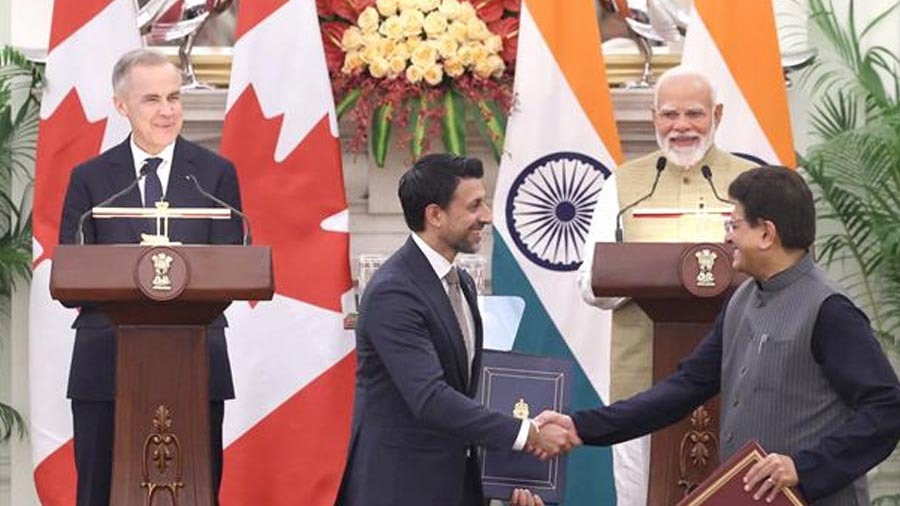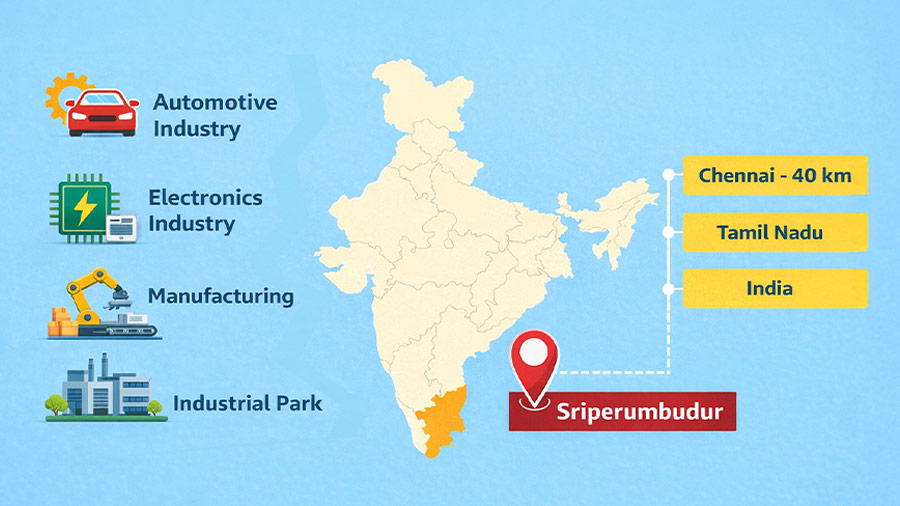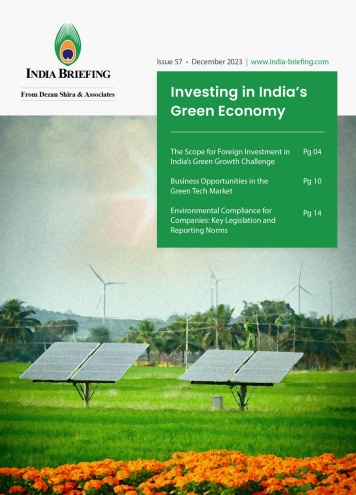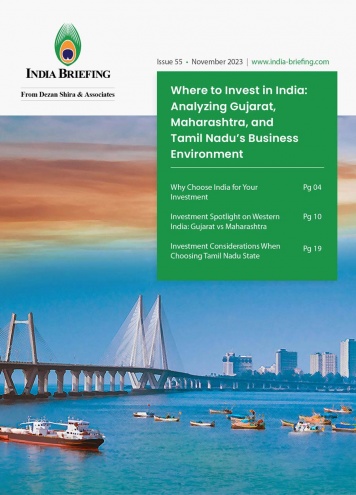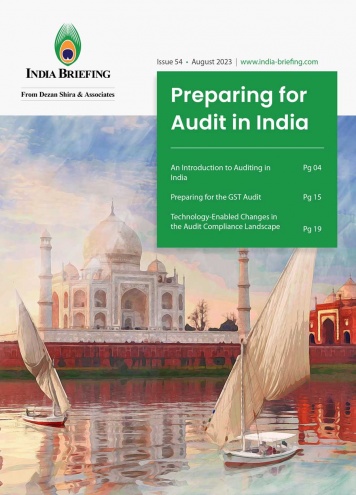-
Other Briefings
- Subscribe
Iran Conflict Raises Oil, Rupee, and Trade Risks for India’s Economy
With over 80 percent oil import dependence and significant Gulf trade exposure, India faces multi-layered risks from the escalating Iran conflict, spanning freight costs, aviation disruption, remittance sensitivity, and equity market volatility.
India’s Next Growth Cycle: Sector Intelligence for Scalable Market Entry
From sector entry considerations to market localization, compliance planning, and export optimization, this magazine provides a practical roadmap for scalable, long-cycle investment in India.
Europe’s India Pivot: Ports, Missiles, and AI
In this op-ed, we discuss how Europe appears to be deepening its engagement with India across maritime connectivity, defense co-production, and AI innovation and governance. A cluster of leadership visits and industrial agreements following the conclusion of the India–EU FTA signals a structural alignment rather than temporary diplomatic momentum.
New FEMA Guarantees Framework: From Approval-Centric Controls to a Principle-Led Regime
The RBI has replaced the Foreign Exchange Management (Guarantees) Regulations, 2000, with the 2026 Regulations, introducing a principle-based, eligibility-driven framework under FEMA while retaining the underlying statutory prohibition structure.
-
India-Canada CEPA 2026: Modi-Carney Sign Terms of Reference, Target US$50 Billion Trade by 2030
Economy & Trade Mar 03 -
India Revises External Commercial Borrowing Framework with 2026 FEMA Amendment: Notes for Businesses
Legal & Regulatory Mar 03 -
Iran Conflict Raises Oil, Rupee, and Trade Risks for India’s Economy
Economy & Trade Mar 03 -
India’s New GDP Series (Base Year 2022-23): Structural Recalibration for Businesses & Investors
Economy & Trade Mar 03 -
India and Brazil Target US$30 Billion Trade by 2030: Strategic Partnership Expands Across Minerals, Tech, and Healthcare
Economy & Trade Feb 27
Get free access to our subscriptions and publications
Subscribe to receive weekly India Briefing news updates, our latest doing business publications, and access to our Asia archives.
Sign Up Now
Economy & Trade
India-Canada CEPA 2026: Modi-Carney Sign Terms of Reference, Target US$50 Billion Trade by 2030
Mar 03India and Canada have set a course to mend diplomatic ties after three years of strained relations. The prime ministers of both countries announced the launch of negotiations for the Comprehensive Economic Partnership Agreement (CEPA), advancing trade, investment, and strategic cooperation.
-
Iran Conflict Raises Oil, Rupee, and Trade Risks for India’s Economy
Economy & Trade Mar 03With over 80 percent oil import dependence and significant Gulf trade exposure, India faces multi-layered risks from the escalating Iran conflict, spanning freight costs, aviation disruption, remittance sensitivity, and equity market volatility.
-
India’s New GDP Series (Base Year 2022-23): Structural Recalibration for Businesses & Investors
Economy & Trade Feb 27India’s new GDP series (base year 2022-23) modernizes economic measurement. This structural recalibration offers investors and businesses deeper sectoral insights and a more accurate reflection of India's growth trajectory.
-
India and Brazil Target US$30 Billion Trade by 2030: Strategic Partnership Expands Across Minerals, Tech, and Healthcare
Economy & Trade Feb 27India and Brazil plan to double bilateral trade to US$30 billion by 2030, expanding cooperation across critical minerals, digital technology, healthcare, and supply chains.
-
US Tariff Twists: Where Does India Stand and How Will Exporters Get Impacted?
Economy & Trade Feb 26With the US Supreme Court tariff ruling, followed by new solar import duties of 125.87 percent on Indian exporters, India-US trade dynamics are being reshaped, prompting exporters and investors to reassess pricing strategies, supply chains, and tariff risk exposure.
Tax & Accounting
India Tax Calendar March 2026: Guide to Advance Tax, Transfer Pricing, and FTC Filing
Feb 26As FY 2025-26 approaches its close, March 2026 represents a key compliance period under India’s direct tax framework. Businesses should review the March tax compliance calendar and ensure timely data reconciliation and reporting readiness.
-
India–France Tax Treaty Revised: Dividend Relief, Capital Gains Changes, and Investor Impact
Tax & Accounting Feb 25The revised India–France tax treaty changes dividend taxes, capital gains rights, and compliance rules. Key insights for French investors and India operations.
-
IGST Applicability on Expatriate Employment in India: Karnataka High Court Provides Tax Clarity
Tax & Accounting Feb 21The Karnataka High Court has clarified the GST treatment of expatriate employment in India, ruling that remuneration paid to foreign employees under a genuine employer-employee relationship is not subject to IGST under the reverse charge mechanism.
-
India's Component Warehousing Safe Harbor: A Competitive Tax Proposition for Global Manufacturers
Tax & Accounting Feb 11India’s Budget 2026-27 introduces a 2 percent safe harbor for bonded component warehousing and a five-year tax exemption for non-resident suppliers, offering transfer pricing certainty and strengthening India’s role in global manufacturing supply chains.
-
India Unveils Draft Income Tax Rules, 2026 Ahead of April 1 Rollout
Tax & Accounting Feb 09India’s tax administration has released the draft Income Tax Rules, 2026. The proposal streamlines the compliance framework, reducing it to 333 rules and 190 statutory forms. Public consultation remains open until February 22, 2026.
Legal & Regulatory
India Revises External Commercial Borrowing Framework with 2026 FEMA Amendment: Notes for Businesses
Mar 03The RBI’s 2026 ECB amendments raise borrowing limits to USD 1 billion, simplify compliance, and restructure India’s cross-border financing framework.
-
Leave India Notice (LIN) on Employment Visa: A Compliance Checklist for Expats
Legal & Regulatory Feb 25A recent judgment by the Karnataka High Court has clarified how Leave India Notices are issued to foreign workers in India, holding that immigration authorities need not separately hear the employee if compliance issues originate from the sponsoring employer.
-
What Counts as an “Industry” Under Indian Law? Supreme Court to Decide on March 17-18
Legal & Regulatory Feb 16India’s Supreme Court will revisit the definition of “industry” under the Industrial Disputes Act, 1947, a ruling that could directly influence the interpretation and implementation of the Industrial Relations Code, 2020.
-
New FEMA Guarantees Framework: From Approval-Centric Controls to a Principle-Led Regime
Legal & Regulatory Feb 16The RBI has replaced the Foreign Exchange Management (Guarantees) Regulations, 2000, with the 2026 Regulations, introducing a principle-based, eligibility-driven framework under FEMA while retaining the underlying statutory prohibition structure.
-
India's Antitrust Regulator CCI Fines Intel US$3.01 Million for Abuse of Dominant Position
Legal & Regulatory Feb 13Antitrust regulator CCI has imposed a US$3.01 million fine on Intel Corporation for an India-specific warranty policy deemed discriminatory and restrictive of parallel imports. The ruling clarifies how dominance is assessed under Indian competition law and highlights key compliance risks global companies.
Industries
Investing in Sriperumbudur: Tamil Nadu's High-Value Manufacturing Corridor
Feb 17Sriperumbudur in Tamil Nadu is one of India’s most strategic high-value corridors, propelled by electronics production and a strong global OEM presence, including Foxconn. The region offers a scalable and de-risked platform for investment in India through 2026.
-
What Counts as an “Industry” Under Indian Law? Supreme Court to Decide on March 17-18
Industries Feb 16India’s Supreme Court will revisit the definition of “industry” under the Industrial Disputes Act, 1947, a ruling that could directly influence the interpretation and implementation of the Industrial Relations Code, 2020.
-
India’s Orange Economy: Creative Industries Outlook After Budget 2026
Industries Feb 16As of 2026, India’s orange economy is emerging as a high-growth services opportunity, spanning media, live concerts, AVGC, and creative industries, supported by policy reform.
-
India Fast-Tracks New Drug & Clinical Trial Approvals with 2026 NDCT Amendments
Industries Feb 12India’s 2026 amendments to the New Drug and Clinical Trials (NDCT) Rules, 2019, materially improve the operating environment for pharmaceutical companies, contract manufacturers, and foreign investors by compressing approval timelines and reducing pre-licensing bottlenecks.
-
India's Textile PLI Scheme: Extended Window till March 31
Industries Feb 10India has extended the application window for the Textile PLI Scheme to March 31, 2026. Businesses in the textile sector should act quickly to secure incentives for scaling production and strengthening export competitiveness.
HR & Payroll
Leave India Notice (LIN) on Employment Visa: A Compliance Checklist for Expats
Feb 25A recent judgment by the Karnataka High Court has clarified how Leave India Notices are issued to foreign workers in India, holding that immigration authorities need not separately hear the employee if compliance issues originate from the sponsoring employer.
-
IGST Applicability on Expatriate Employment in India: Karnataka High Court Provides Tax Clarity
HR & Payroll Feb 21The Karnataka High Court has clarified the GST treatment of expatriate employment in India, ruling that remuneration paid to foreign employees under a genuine employer-employee relationship is not subject to IGST under the reverse charge mechanism.
-
What Counts as an “Industry” Under Indian Law? Supreme Court to Decide on March 17-18
HR & Payroll Feb 16India’s Supreme Court will revisit the definition of “industry” under the Industrial Disputes Act, 1947, a ruling that could directly influence the interpretation and implementation of the Industrial Relations Code, 2020.
-
Uttar Pradesh Updates Shops & Establishments Law: Check Applicability, Working Hours, and Compliance
HR & Payroll Feb 11The Indian state of Uttar Pradesh has overhauled its Shops and Commercial Establishments Act, expanding statewide applicability and modernizing employer compliance. The latest updates include threshold-based coverage, digital registration, revised working hours, and stronger enforcement for businesses operating in the state.
-
Madhya Pradesh Shops & Establishments Act Amendment: Digital Compliance Reforms and Employer Implications
HR & Payroll Feb 10The Madhya Pradesh Shops & Establishment Act, Second Amendment, enacted on December 15, 2025, brings digital registration, online inspections, real-time updates, and simplified compliance for employers operating in the state.
Expert Guidance about Business in Asia
Dezan Shira & Associates is a pan-Asia, multi-disciplinary professional services firm, providing market entry, legal, accounting, tax, HR, technology and operational advisory to international investors.
Business Updates for All Asia Markets
Asia Briefing publishes articles, magazines, and guides on doing business in Asia. Dezan Shira & Associates has produced the publication since 1999.
Need More Guidance?
India Briefing Publications
Download magazines and guides on doing business in India.
Download Now




